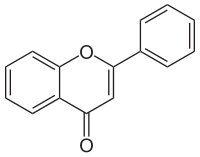
Photo from wikipedia
Introduction: The links between flavonoid intake and mortality were previously evaluated in epidemiological studies. The aim of the present study was to perform a systematic review and meta-analysis of cohort… Click to show full abstract
Introduction: The links between flavonoid intake and mortality were previously evaluated in epidemiological studies. The aim of the present study was to perform a systematic review and meta-analysis of cohort studies evaluating the link of flavonoid consumption with total and cause-specific mortality. Methods: Prospective cohort studies reporting flavonoid intake and mortality data published up to 30th April 2019 (without language restriction) were searched using PubMed, Scopus and EMBASE database. Generic inverse variance methods and random effects models were used to synthesize pooled and quantitative data. Sensitivity analysis was also performed by a leave-one-out method. Results: Overall, 16 articles met the inclusion criteria (nine studies were performed in Europe, five in the USA, one in Asia and one in Oceania); a total of 462,194 participants (all adults aged >19 years) with 23,473 mortality cases were included in the final analysis. The duration of follow-up ranged from 4.8 to 28 years. Most of the studies assessed flavonoid intake using food frequency questionnaires, whereas four studies used interviews and 1 study used 4-day food records. The meta-analysis showed that flavonoid consumption was inversely and significantly associated with total (relative risk (RR): 0.87, 95% confidence interval (CI) = 0.77–0.99) and cardiovascular disease mortality risk (RR: 0.85, 95%CI = 0.75–0.97), but not cancer (0.86, 95%CI = 0.65–1.14) mortality risk. These findings remained robust in sensitivity analyses. Conclusions: The present findings highlight the potential protective role of flavonoids against total and cause-specific mortality. These results support the recommendations for flavonoid-rich foods intake to prevent chronic diseases.
Journal Title: Nutrients
Year Published: 2020
Link to full text (if available)
Share on Social Media: Sign Up to like & get
recommendations!